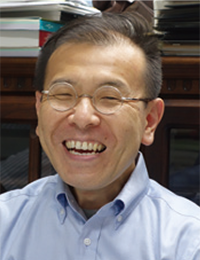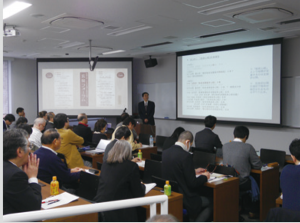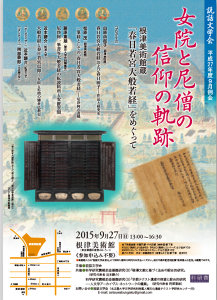キーワード: 日本研究、祈り、宗教文芸、法会、比較研究
 「日本を研究する」とはどういうことでしょう。これに挑む多様な専門の研究者の力を合わせて、「時間」「空間」「対象」等さまざまな角度から「日本」をとらえようとしています。普段の学会では重なり合わないそれぞれの専門分野に、接点となりうる共通の話題を投げ込んだら、どんな化学反応が起きるのか?そこから得られるあらたな研究成果を求めるリサーチユニットが、この「新研究領域創出型日本研究」なのです。
「日本を研究する」とはどういうことでしょう。これに挑む多様な専門の研究者の力を合わせて、「時間」「空間」「対象」等さまざまな角度から「日本」をとらえようとしています。普段の学会では重なり合わないそれぞれの専門分野に、接点となりうる共通の話題を投げ込んだら、どんな化学反応が起きるのか?そこから得られるあらたな研究成果を求めるリサーチユニットが、この「新研究領域創出型日本研究」なのです。
祈りの文化史は時空を超える
現在、リサーチユニットの中核に据えているテーマは「祈りの文化史」です。現代の日本の祈りの歴史は、前近代からの国内での文化の熟成のほか、仏教伝来以来の海外との交流の繰り返しによって成り立っています。その意味を理解する上では、日本に渡来した文化の源流の探求や比較研究の視点が自ずと必要になってきます。このような問題意識に基づき、昨年は、玄奘三蔵をインドから日本までの視野でとらえ直す学際的・国際的なフォーラムを行いました。(図1)
たとえば、祈りの文化史を考えるために、「法会」という場を考えてみましょう。法会の行われる寺院空間は、仏像・曼荼羅・音楽・芸能に彩られ、僧侶の発することばがその空間を荘厳していく、まさにそれらの交響の場なのです。こうした研究対象に挑む際には、人文学諸領域の知はもちろんのこと、寺院建築など理系の学問の知をも結集して取り組む必要が生じます。
このリサーチユニットが目指すのは、そうしたスリリングな知の交流による、日本理解の核心に迫るあらたな研究の創出です。
知の激突による領域横断的研究
学際的な領域の共同研究を、専門分野を異にする研究者が集まってすすめる場合、ともすれば、おのおのの研究の表層的な部分の議論にとどまる傾向があります。
本リサーチユニットでの議論は、自分の専門を解体したり譲歩したりするのではなく、むしろ、それぞれの専門性をもとに分析を深めることを意識しています。これにより、既成の学会の枠組みを超えるようなあたらしい成果がうまれることを目指しつつ共同研究を進めています。議論の場では、意外な発見に驚いたり、思わぬ展開に冷や汗が出たりすることもしばしばですが、それぞれの培ってきた深い専門領域の知に裏打ちされているからこそ、真にエキサイティング
な学究の場となっていると自負しています。
社会への貢献・実績
●ハーバード大学、ロンドン大学SOAS、イリノイ大学、ヘルシンキ大学、タリン大学、台湾国立政治大学、リュブリャーナ大学、タシケント国立東洋学大学等にて、国際フォーラムを開催
●筑波大学東京キャンパスにて、第5 回東アジア宗教文献国際研究集会「玄奘フォーラム」を、国内外の研究者を招いて開催(図1)
●根津美術館にて説話文学会シンポジウム「 女院と尼僧の信仰の軌跡―根津美術館蔵「 春日若宮大般若経」をめぐって―」を開催(図2)

図1:「玄奘フォーラム」における阿部龍一ハーバード大学 教授による基調講演

図2:経典書写をテーマとした説話文学会のポスター
Integration of knowledge obtained from various fields of humanities to analyze “Japan” through the cultural history of prayers
Unit members : Ono, Masaki Fujikawa, Masaki Hiraishi, Noriko
Unit name: Innovative Research Unit of Japanese Studies
Key words: research on Japan, prayer, religious literary, houe gathering, comparative studies
 What is “research on Japan”? Specialists from many different fields collaborate with each other to take on the challenge of acquiring a better understanding of “Japan” from various perspectives, including “time”, “space”, and “subjects”. Researchers usually hold academic conferences in each specialized field. What chemical reaction occurs, if researchers from various fields take on the same subject that can be an interface between different fields? “Innovative Research Unit of Japanese Studies” is a research unit organized to generate research results based this approach.
What is “research on Japan”? Specialists from many different fields collaborate with each other to take on the challenge of acquiring a better understanding of “Japan” from various perspectives, including “time”, “space”, and “subjects”. Researchers usually hold academic conferences in each specialized field. What chemical reaction occurs, if researchers from various fields take on the same subject that can be an interface between different fields? “Innovative Research Unit of Japanese Studies” is a research unit organized to generate research results based this approach.
Cultural history of prayers that transcends time and space
The core theme of the research unit is the “cultural history of prayers”. The history of prayers in Japan is characterized by the maturation of its culture since the pre-modern period and a large number of exchanges with foreign countries since the introduction of Buddhism to Japan. To understand the meaning of the history of prayers, it is necessary to explore the origins of cultures brought to Japan from other countries or areas, and conduct comparative studies. Based on the awareness of the issue, we held an interdisciplinary, international forum to review Genjo-Sanzo, a Buddhist priest, from various perspectives, including those of India and Japan (Figure 1).
Let us discuss “houe”, a type of gathering, to review the cultural history of prayers. When “houe” is held in a temple, it will be turned into a place for symphony, decorated with Buddhist images and mandala patterns, in which music and entertainment are performed, and the remarks of priests will increase its magnificence. To conduct research on such a subject, it is necessary to combine expertise obtained from the fields of humanities with knowledge from temple construction and other scientific fields.
The research unit aims to conduct innovative research to analyze the core essence in understanding Japan through thrilling exchange of knowledge.
Cross-disciplinary studies based on varieties of knowledge that inspire each other
When conducting collaborative research in interdisciplinary fields, researchers from different specialties tend to discuss only the superficial aspects of their specialized research.
The research unit encourages its members to conduct in-depth analyses based on their specialties, rather than dissolving their specialized fields or compromising. The members conduct collaborative research to generate research results beyond the frameworks of existing academic societies. Although researchers often become surprised at unexpected discoveries and feel uneasy when debates make unanticipated turns, during discussions, their views are based on in-depth knowledge obtained from their specialized fields, and the discussions are opportunities for exciting academic research in a true sense.
Social contributions and achievements
– Held international forums in Harvard University, the SOAS of the University of London, the University of Illinois, University of Helsinki, Tallinn University, National Chengchi University, University of Ljubljana, and Tashkent State Institute of Oriental Studies
– Held the 5th International Research Meeting for East Asian Religion and Literature: “Genjo Forum”, on the Tokyo Campus of the University of Tsukuba, inviting researchers from across Japan and other countries (Figure 1).
– Held a narrative literature symposium in Nezu Museum: “Histories of the Nyoin system and beliefs among nuns – A study of ‘Kasuga-wakamiya-daihannyakyo’ stored in Nezu Museum” (Figure 2)

Figure 1: Keynote lecture delivered by Professor Ryuichi Abe of Harvard University at the “Genjo Forum”

Figure 2: A poster of the narrative literature symposium held under the theme of the transcription of Buddhist sutra
Interviewed on September 10, 2015
